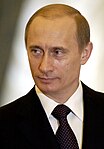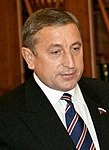2004 Russian presidential election
| |||||||||||||||||
| Opinion polls | |||||||||||||||||
| Registered | 108,064,281 | ||||||||||||||||
|---|---|---|---|---|---|---|---|---|---|---|---|---|---|---|---|---|---|
| Turnout | 64.32% ( | ||||||||||||||||
| |||||||||||||||||
 Results by federal subject Vladimir Putin: 50–55% 55–60% 60–65% 65–70% 70–75% 75–80% 80–85% 85–90% 90–95% >95% | |||||||||||||||||
| |||||||||||||||||
Presidential elections were held in Russia on 14 March 2004.[1] Incumbent President Vladimir Putin was seeking a second full four-year term. It was a landslide victory for Putin, who was re-elected with 72% of the vote.
Candidates
[edit]Registered candidates
[edit]Candidates are listed in the order they appear on the ballot paper (alphabetical order in Russian).
| Candidate name, age, political party |
Political offices | Details | ||
|---|---|---|---|---|
| Sergey Glazyev (43) Independent (campaign) |

|
Leader of the Rodina party (2003–2004) Deputy of the State Duma (1993–1995 and 1999–2007) Minister of Foreign Economic Relations of Russia (1992–1993) |
Glazyev was Minister of Foreign Economic Relations of Russia under Boris Yeltsin, a Communist member of the State Duma and in 2003 became co-chairman of the newly established Rodina party. However, he failed to win the Rodina nomination because of a power struggle with Dmitri Rogozin, and ran as independent candidate. He campaigned as a critic of economic reforms. He argued that post-Communist governments have ignored social justice and promised to improve welfare. | |
| Oleg Malyshkin (52) Liberal Democratic Party (campaign) |
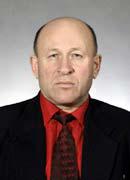
|
Deputy of the State Duma (2003–2007) |
Malyshkin was nominated by the Liberal Democratic Party, after the party leader Vladimir Zhirinovsky, who contested the last three presidential elections, chose not to run again. Malyshkin, a mining engineer, had been an LDPR member since 1991 and the head of security of Vladimir Zhirinovsky. He was elected to the State Duma in 2003. | |
| Sergey Mironov (51) Russian Party of Life (campaign) |
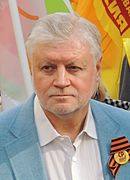
|
Chairman of the Federation Council (2001–2011) Senator from Saint Petersburg (2001–2011) |
Mironov was Chairman of the Federation Council, the upper house of the Russian parliament, and was considered a loyalist to Vladimir Putin. Prior to launching his campaign, he expressed his support for Putin's candidacy. | |
| Vladimir Putin (51) Independent (campaign) |

|
President of Russia (2000–2008 and 2012–present) Prime Minister of Russia (1999–2000 and 2008–2012) Director of the Federal Security Service (1998–1999) |
Putin, formerly Prime Minister, was elected President in 2000, and ran for a second term. His popularity remained quite high during his term in office thanks to economic stability and despite controversies on media freedoms. He refused United Russia's invitation to be nominated as party candidate and ran as an independent. | |
| Irina Khakamada (48) Independent (campaign) |
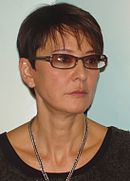
|
Deputy of the State Duma (1993–2003) |
Khakamada, the daughter of a Japanese Communist who took Soviet citizenship in the 1950s, emerged as Putin's most outspoken critic. A member of the State Duma for eight years, she lost her seat in 2003. She was a member of the Union of Rightist Forces, but did not run as a party candidate. "I am not afraid of the terrorists in power," she told the daily newspaper Kommersant. "Our children must grow up as free people. Dictatorship will not be accepted." | |
| Nikolay Kharitonov (55) Communist Party (campaign) |
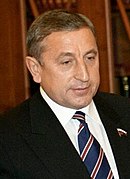
|
Deputy of the State Duma (1993–present) |
Kharitonov was the candidate of the Communist Party of the Russian Federation, despite not being a member of the party. A former KGB colonel, he was a member of the Agrarian Party of Russia, an ally of the Communist Party. He was put forward after Communist leader Gennady Zyuganov declined to stand for a third time. | |
Withdrawn candidates
[edit]| Candidate name, age, political party |
Political offices | Details | Date of withdrawal | ||
|---|---|---|---|---|---|
| Ivan Rybkin (57) Independent (campaign) |

|
Secretary of the Security Council (1996-1998) Chairman of the State Duma (1994-1995) Deputy of the State Duma (1993-1996) |
Rybkin was former Chairman of the State Duma, the lower house of the Russian parliament, was nominated as a presidential candidate on 29 December 2003. On 7 February 2004, he was registered as a presidential candidate, but after his scandalous disappearance and his appearance in Kyiv in February 2004, he withdrew on 6 March.[2] | 6 March 2004 | |
Opinion polls
[edit]Conduct
[edit]General assessments
[edit]Observers representing the Organization for Security and Co-operation in Europe and the Parliamentary Assembly of the Council of Europe, cited what they called abuses of government resources, bias in the state media and instances of ballot stuffing on election day. According to the ad hoc Committee by the Parliamentary Assembly of the Council of Europe, "the elections were generally well administrated and reflected the consistently high public approval rating of the incumbent president but lacked elements of a genuine democratic contest."
"While on a technical level the election was organized with professionalism, particularly on the part of the Central Election Commission (CEC), the election process overall did not adequately reflect principles necessary for a healthy democratic election process. The election process failed to meet important commitments concerning treatment of candidates by the State-controlled media on a non-discriminatory basis, equal opportunities for all candidates and secrecy of the ballot," reported observers by Organization for Security and Co-operation in Europe. "Localised instances of election-related abuse of official function, whilst met with an appropriately robust response by the electoral authorities in some instances, reflected a lack of democratic culture, accountability and responsibility, particularly in areas distant from the capital."
Observers representing the Commonwealth of Independent States recognized the election as "free, democratic and fair".[3] The head of the mission Yury Yarov assured that violations identified during the mission didn't affect "free expression of the electors' will and result of the election".
Election campaign
[edit]According to report by an ad hoc Committee by the Parliamentary Assembly of the Council of Europe, "The Presidential Election Law and the Basic Guarantees of Electoral Rights Law provided the legal framework for the presidential elections, laying down conditions for the transparency in the organisation and conduct of the election." Criticizing the election campaign, the Committee claimed as "unreasonable hurdle" the requirement to collect 2 million signatures for submission to the CEC in support of persons seeking registration as candidates. Another concern was, "The Russian Constitution stipulates that in a presidential election, if the turnout is less than 50%, a new round has to be held, with candidates registering anew. This clause raised concerns of authorities on voters turnout and a massive campaign encouraging people to participate in elections had been launched by the CEC and local authorities. In some regions, local authorities overused their power to force people to take part in the elections." The election campaign in general was "low-key and all but invisible, which could be explained by the predictability of the results of the election." Glazyev's manager reported the use of administrative resources by preventing Glazyev from campaigning in the regions; Khakamada claimed that "local authorities were instructed to hamper her meetings with voters".
PACE reported that despite some irregularities, "credit should be given to the election administration which ensured security and professional conduct of the voting process". PACE noted the unusually high turnout in five North Caucasus republics (more than 90%), "Mr Putin received 98.2 % of the vote in Ingushetia, 96.5 % in Kabardino-Balkaria, 94,6 % in Dagestan, 92.3% in Chechnya and 91.25% in North Ossetia. Taking into account that the general turnout of the election was only 64.39%, the election results in these regions seem to be unusually high and one-sided." Considering situation in Chechnya, the Moscow Times quoted election officials in the republic's capital, Grozny, as acknowledging that they had filled in several thousand ballots for Putin.[4]
Media bias
[edit]The report of PACE said that "during the presidential election the International Election Observation Mission concluded that state-controlled media had displayed clear bias in favour of the incumbent in news presentation and coverage of the campaign."
According to the report by Office for Democratic Institutions and Human Rights (OSCE) of the Organization for Security and Co-operation in Europe,
Television is the main source of public information in the Russian Federation. Two State-controlled TV channels have countrywide outreach, while the most significant private TV stations are NTV and Ren TV… The State-controlled media comprehensively failed to meet its legal obligation to provide equal treatment to all candidates, displaying clear favouritism towards Mr. Putin. While the other candidates had access to television and other media, through free airtime and televised debates, their access to the primetime news programmes and current affairs programmes on the State-controlled broadcasters was limited… In contrast to the coverage by State-funded TV channels, private broadcasters monitored by the EOM provided more balanced coverage, with a greater diversity of views.[5]
In the month prior to the election, state-funded Channel One Russia dedicated more than four hours of its news coverage to Putin, with the coverage being overwhelmingly positive.[5] In contrast, the second-most covered candidate on Channel One was Kharitonov, who received a mere 21 minutes of primetime news coverage.[5]
State-funded TV Russia gave Putin nearly two hours of primetime news, with the tone of the coverage being overwhelmingly positive.[5] In contrast, Glazeyev was given only four minutes of coverage, the tone of which ranged from negative to neutral.[5]
TV Centre, a television station that was controlled by the Moscow City administration, provided an hour and 25 minutes of coverage to Putin, with the tone being overwhelmingly positive.[5] In contrast, TV Centre gave Glazeyev a mere seven minutes of coverage, which ranged in tone from negative to neutral.[5]
Private broadcasters were more balanced in their television coverage.[5] REN TV gave 35 minutes of primetime news to Mr. Putin, with 35% of this coverage being negative.[5] They gave Khakamada 22 minutes of coverage which ranged from neutral to positive in tone.[5] NTV gave more than 31 minutes of coverage to Mr. Putin, ranging in tone from neutral to positive.[5] In its analytical news programs, such as Svoboda Slova and Namedni, NTV gave a relatively balanced picture of the main contestants and the State leadership.[5] NTV, however, did not air election debates due to Putin’s refusal to take part.[5] Additionally, NTV did not air special broadcasts for campaign programming citing to low public interest.[5]
Most local television outlets provided very little coverage of the election. What coverage they did provide generally tended to be favorable of Putin.[5]
Many media outlets ignored key developments in the campaign's of Putin's challengers. For instance, very few media outlets (both television and print) carried news of Khakamada's campaign announcement.[6]
Print media displayed a variety of views, with coverage of various outlets being either strongly pro-Putin or strongly anti-Putin in bias.[5]
Calls for boycott
[edit]A few groups, notably the Yabloko party and a number of human rights organizations, encouraged voters to boycott the election.[6] Yabloko's leader Grigory Yavlinsky specifically called for boycotts to take place in protest of what he considered to be "the slide of the country into authoritarianism".[6]
Results
[edit]| Candidate | Party | Votes | % | |
|---|---|---|---|---|
| Vladimir Putin | Independent | 49,563,020 | 71.91 | |
| Nikolay Kharitonov | Communist Party | 9,514,224 | 13.80 | |
| Sergey Glazyev | Independent | 2,850,330 | 4.14 | |
| Irina Khakamada | Independent | 2,671,519 | 3.88 | |
| Oleg Malyshkin | Liberal Democratic Party | 1,405,396 | 2.04 | |
| Sergey Mironov | Russian Party of Life | 524,392 | 0.76 | |
| Against all | 2,396,550 | 3.48 | ||
| Total | 68,925,431 | 100.00 | ||
| Valid votes | 68,925,431 | 99.17 | ||
| Invalid/blank votes | 578,847 | 0.83 | ||
| Total votes | 69,504,278 | 100.00 | ||
| Registered voters/turnout | 108,064,281 | 64.32 | ||
| Source: CEC | ||||
By federal subject
[edit]| Federal subject | Putin | Kharitonov | Glazyev | Khakamada | Malyshkin | Mironov | Against All | |||||||
|---|---|---|---|---|---|---|---|---|---|---|---|---|---|---|
| Votes | % | Votes | % | Votes | % | Votes | % | Votes | % | Votes | % | Votes | % | |
| Adygea | 184,326 | 75.61 | 35,224 | 14.45 | 7,319 | 3.00 | 3,896 | 1.60 | 3,593 | 1.47 | 1,220 | 0.50 | 6,463 | 2.65 |
| Altai Republic | 65,751 | 73.03 | 11,812 | 13.48 | 2,974 | 3.39 | 3,074 | 3.51 | 1,213 | 1.38 | 643 | 0.73 | 1,495 | 1.71 |
| Bashkortostan | 2,365,768 | 91.78 | 102,189 | 3.96 | 28,603 | 1.11 | 28,748 | 1.12 | 12,748 | 0.49 | 8,420 | 0.33 | 18,356 | 0.71 |
| Buryatia | 298,120 | 66.58 | 76,483 | 17.08 | 12,812 | 2.86 | 32,299 | 7.21 | 7,234 | 1.62 | 3,461 | 0.77 | 11,904 | 2.66 |
| Chechnya | 521,317 | 92.30 | 12,950 | 2.29 | 3,636 | 0.64 | 15,068 | 2.67 | 2,052 | 0.36 | 2,010 | 0.36 | 4,513 | 0.80 |
| Chuvashia | 427,489 | 67.12 | 137,093 | 21.52 | 18,037 | 2.83 | 16,028 | 2.52 | 11,408 | 1.79 | 3,949 | 0.62 | 13,252 | 2.08 |
| Dagestan | 1,263,386 | 94.61 | 50,866 | 3.81 | 3,231 | 0.24 | 3,426 | 0.26 | 2,158 | 0.16 | 2,255 | 0.17 | 5,815 | 0.44 |
| Ingushetia | 147,527 | 98.18 | 782 | 0.52 | 179 | 0.12 | 157 | 0.10 | 281 | 0.19 | 1,101 | 0.73 | 90 | 0.06 |
| Kabardino-Balkaria | 491,916 | 96.49 | 11,310 | 2.22 | 1,880 | 0.37 | 1,562 | 0.31 | 722 | 0.14 | 611 | 0.12 | 1,250 | 0.25 |
| Kalmykia | 114,713 | 79.23 | 16,115 | 11.13 | 3,283 | 2.27 | 5,790 | 4.00 | 1,390 | 0.96 | 549 | 0.38 | 1,692 | 1.17 |
| Karachay-Cherkessia | 204,020 | 82.28 | 28,455 | 11.48 | 3,949 | 1.59 | 3,727 | 1.50 | 1,919 | 0.77 | 1,086 | 0.44 | 3,383 | 1.36 |
| Karelia | 237,778 | 74.14 | 32,482 | 10.13 | 8,599 | 2.68 | 17,364 | 5.48 | 7,241 | 2.26 | 3,540 | 1.10 | 11,414 | 3.56 |
| Khakassia | 135,708 | 61.41 | 40,568 | 18.36 | 15,287 | 6.92 | 8,904 | 4.03 | 7,329 | 3.32 | 2,336 | 1.06 | 8,857 | 4.01 |
| Komi Republic | 322,023 | 73.59 | 50,974 | 11.65 | 14,558 | 3.33 | 16,061 | 3.67 | 11,314 | 2.59 | 3,691 | 0.84 | 15,799 | 3.61 |
| Mari El | 239,483 | 67.30 | 64,551 | 18.14 | 14,635 | 4.11 | 11,522 | 3.24 | 8,540 | 2.40 | 2,959 | 0.83 | 11,017 | 3.10 |
| Mordovia | 560,327 | 91.35 | 27,807 | 4.53 | 6,172 | 0.66 | 4,038 | 0.66 | 4,057 | 0.66 | 1,471 | 0.24 | 4,626 | 0.75 |
| North Ossetia-Alania | 361,248 | 91.25 | 24,806 | 6.27 | 1,995 | 0.50 | 1,795 | 0.45 | 1,297 | 0.33 | 920 | 0.23 | 1,757 | 0.44 |
| Sakha Republic | 326,711 | 60.76 | 53,061 | 11.33 | 15,675 | 3.35 | 40,917 | 8.74 | 7,353 | 1.57 | 3,430 | 0.73 | 16,746 | 3.58 |
| Tatarstan | 1,879,023 | 82.58 | 150,048 | 6.59 | 54,853 | 2.41 | 70,767 | 3.11 | 24,644 | 1.08 | 23,188 | 1.02 | 49,655 | 2.18 |
| Tuva | 102,341 | 87.53 | 7,035 | 6.02 | 1,525 | 1.30 | 2,329 | 1.99 | 837 | 0.72 | 545 | 0.47 | 1,197 | 1.02 |
| Udmurtia | 613,335 | 75.97 | 75,506 | 9.35 | 32,303 | 4.00 | 31,246 | 3.87 | 20,961 | 2.60 | 6,465 | 0.80 | 18,797 | 2.33 |
| Altai Krai | 870,385 | 67.64 | 239,222 | 18.59 | 52,636 | 4.09 | 35,246 | 2.74 | 37,691 | 2.93 | 9,838 | 0.76 | 28,725 | 2.23 |
| Khabarovsk Krai | 473,495 | 64.52 | 95,555 | 13.02 | 42,096 | 5.74 | 37,204 | 5.07 | 24,496 | 3.34 | 8,215 | 1.12 | 45,727 | 6.23 |
| Krasnodar Krai | 1,607,902 | 67.37 | 459,807 | 19.27 | 98,805 | 4.14 | 68,816 | 2.88 | 44,653 | 1.87 | 13,929 | 0.58 | 73,765 | 3.09 |
| Krasnoyarsk Krai | 671,836 | 60.31 | 123,553 | 11.09 | 191,996 | 17.23 | 44,859 | 4.03 | 23,160 | 2.08 | 7,286 | 0.65 | 43,219 | 3.88 |
| Primorsky Krai | 585,850 | 59.37 | 167,576 | 16.98 | 55,382 | 5.61 | 55,565 | 5.63 | 42,656 | 4.32 | 9,874 | 1.00 | 59,976 | 6.08 |
| Stavropol Krai | 733,188 | 64.54 | 242,181 | 21.32 | 42,948 | 3.78 | 32,861 | 2.89 | 28,061 | 2.47 | 8,354 | 0.74 | 40,159 | 3.54 |
| Amur Oblast | 261,781 | 64.87 | 75,636 | 18.74 | 18,552 | 3.43 | 13,952 | 3.46 | 13,840 | 3.43 | 3,637 | 0.90 | 12,850 | 3.18 |
| Arkhangelsk Oblast | 483,022 | 77.45 | 58,990 | 9.46 | 18,906 | 3.03 | 26,204 | 4.20 | 11,522 | 1.85 | 4,806 | 0.77 | 16,732 | 2.68 |
| Astrakhan Oblast | 291,499 | 66.08 | 80,643 | 18.28 | 21,024 | 4.77 | 15,197 | 3.44 | 9,677 | 2.19 | 2,980 | 0.68 | 15,845 | 3.59 |
| Belgorod Oblast | 457,183 | 54.82 | 230,326 | 27.62 | 41,404 | 4.96 | 26,492 | 3.18 | 21,356 | 2.56 | 6,941 | 0.83 | 40,478 | 4.85 |
| Bryansk Oblast | 417,481 | 63.57 | 152,874 | 23.28 | 26,712 | 4.07 | 15,195 | 2.31 | 13,131 | 2.00 | 6,035 | 0.92 | 19,681 | 3.00 |
| Chelyabinsk Oblast | 1,236,952 | 70.18 | 249,852 | 14.18 | 60,191 | 3.42 | 69,903 | 3.97 | 43,589 | 2.47 | 12,858 | 0.73 | 72,215 | 4.10 |
| Chita Oblast | 311,661 | 72.49 | 63,530 | 14.78 | 13,381 | 3.11 | 11,033 | 2.57 | 12,304 | 2.86 | 4,000 | 0.93 | 99,26 | 2.31 |
| Ivanovo Oblast | 326,546 | 67.21 | 79,536 | 16.37 | 21,090 | 4.34 | 17,156 | 3.53 | 14,322 | 2.95 | 4,382 | 0.90 | 19,757 | 4.07 |
| Irkutsk Oblast | 578,241 | 61.96 | 156,401 | 16.76 | 53,551 | 5.74 | 51,951 | 5.57 | 37,180 | 3.98 | 9,345 | 1.00 | 39,283 | 4.21 |
| Kaliningrad Oblast | 278,819 | 69.86 | 47,068 | 11.79 | 20,063 | 5.03 | 17,515 | 4.39 | 7,880 | 1.97 | 4,342 | 1.09 | 20,005 | 5.01 |
| Kaluga Oblast | 327,778 | 70.16 | 68,807 | 14.73 | 20,966 | 4.49 | 17,109 | 3.66 | 8,524 | 1.82 | 3,058 | 0.65 | 17,100 | 3.66 |
| Kamchatka Oblast | 108,057 | 71.82 | 13,910 | 9.25 | 8,402 | 5.58 | 7,593 | 5.505 | 3,896 | 2.59 | 1,343 | 0.89 | 6,463 | 4.30 |
| Kemerovo Oblast | 1,043,186 | 71.51 | 165,019 | 11.31 | 60,452 | 4.14 | 53,001 | 3.53 | 50,163 | 3.44 | 15,008 | 1.03 | 58,663 | 4.02 |
| Kirov Oblast | 459,684 | 65.52 | 137,593 | 19.61 | 32,212 | 4.59 | 23,192 | 3.31 | 18,435 | 2.63 | 6,807 | 0.97 | 19,202 | 2.74 |
| Kostroma Oblast | 219,379 | 69.22 | 58,760 | 18.54 | 10,168 | 3.21 | 8,768 | 2.77 | 7,016 | 2.21 | 3,213 | 1.01 | 7,927 | 2.50 |
| Kurgan Oblast | 327,005 | 66.94 | 93,588 | 19.16 | 16,955 | 3.47 | 11,486 | 2.35 | 19,518 | 4.00 | 3,523 | 0.72 | 13,022 | 2.67 |
| Kursk Oblast | 402,171 | 65.24 | 129,919 | 21.08 | 23,479 | 3.81 | 14,645 | 2.38 | 14,591 | 2.37 | 5,310 | 0.86 | 19,934 | 3.23 |
| Leningrad Oblast | 588,807 | 77.10 | 77,691 | 10.17 | 24,205 | 3.17 | 26,509 | 3.47 | 10,210 | 1.34 | 8,123 | 1.06 | 23,418 | 3.07 |
| Lipetsk Oblast | 399,465 | 63.62 | 133,637 | 21.28 | 24,439 | 3.89 | 14,352 | 2.29 | 16,675 | 2.66 | 4,700 | 0.75 | 28,613 | 4.56 |
| Magadan Oblast | 57,145 | 70.05 | 8,444 | 10.35 | 3,605 | 4.42 | 5,087 | 6.24 | 2,497 | 3.06 | 780 | 0.96 | 3,541 | 4.34 |
| Moscow Oblast | 2,249,167 | 71.12 | 336,441 | 10.64 | 184,077 | 5.82 | 132,942 | 4.20 | 49,743 | 1.57 | 19,318 | 0.61 | 162,251 | 5.13 |
| Murmansk Oblast | 314,098 | 74.04 | 34,549 | 8.14 | 16,991 | 4.01 | 21,355 | 5.03 | 10,782 | 2.54 | 4,126 | 0.97 | 20,325 | 4.79 |
| Nizhny Novgorod Oblast | 1,051,605 | 65.88 | 274,862 | 17.22 | 62,875 | 3.94 | 81,432 | 5.10 | 35,136 | 2.20 | 12,436 | 0.78 | 66,503 | 4.17 |
| Novgorod Oblast | 214,103 | 71.74 | 41,481 | 13.90 | 10,508 | 3.52 | 10,585 | 3.55 | 7,245 | 2.43 | 2,501 | 0.84 | 10,334 | 3.46 |
| Novosibirsk Oblast | 795,509 | 63.10 | 272,222 | 21.59 | 56,036 | 4.44 | 54,830 | 4.35 | 22,122 | 1.75 | 7,680 | 0.61 | 39,453 | 3.13 |
| Omsk Oblast | 699,374 | 67.03 | 181,589 | 17.40 | 38,408 | 3.68 | 42,104 | 4.04 | 32,372 | 3.10 | 7,755 | 0.74 | 32,655 | 3.13 |
| Orenburg Oblast | 612,399 | 58.79 | 255,960 | 24.57 | 52,017 | 4.99 | 27,684 | 2.66 | 38,258 | 3.67 | 7,597 | 0.73 | 37,834 | 3.63 |
| Oryol Oblast | 323,066 | 61.66 | 125,903 | 24.03 | 20,365 | 3.89 | 13,202 | 2.52 | 12,009 | 2.29 | 4,034 | 0.77 | 20,092 | 3.83 |
| Penza Oblast | 477,530 | 64.56 | 149,092 | 20.16 | 41,559 | 5.62 | 18,422 | 2.49 | 16,472 | 2.23 | 5,380 | 0.73 | 23,003 | 3.11 |
| Perm Oblast | 905,707 | 72.75 | 125,678 | 10.10 | 46,691 | 3.75 | 64,463 | 5.18 | 32,884 | 2.64 | 12,700 | 1.02 | 46,954 | 3.77 |
| Pskov Oblast | 265,503 | 70.79 | 62,389 | 16.64 | 13,106 | 3.49 | 11,732 | 3.13 | 6,076 | 1.62 | 4,411 | 1.18 | 9,348 | 2.49 |
| Rostov Oblast | 1,716,325 | 72.49 | 336,636 | 14.22 | 87.455 | 3.69 | 71,206 | 3.01 | 55,200 | 2.33 | 14,524 | 0.51 | 71,108 | 3.00 |
| Ryazan Oblast | 444,939 | 73.22 | 83,256 | 13.70 | 26,178 | 4.31 | 16,205 | 2.67 | 10,195 | 1.68 | 3,852 | 0.63 | 16,509 | 2.72 |
| Samara Oblast | 921,135 | 63.28 | 278,371 | 19.12 | 68,149 | 4.68 | 62,723 | 4.31 | 34,194 | 2.35 | 13,953 | 0.96 | 60,695 | 4.17 |
| Saratov Oblast | 1,017,875 | 70.79 | 244,829 | 17.03 | 46,051 | 3.20 | 36,804 | 2.56 | 26,770 | 1.86 | 9,055 | 0.63 | 42,412 | 2.95 |
| Sakhalin Oblast | 154,204 | 68.41 | 31,772 | 14.10 | 9,208 | 4.09 | 11,292 | 5.01 | 5,801 | 2.57 | 1,609 | 0.71 | 9,677 | 4.29 |
| Sverdlovsk Oblast | 1,506,293 | 76.34 | 153,519 | 7.78 | 70,906 | 3.59 | 109,935 | 5.57 | 43,118 | 2.19 | 13,147 | 0.67 | 55,746 | 2.83 |
| Smolensk Oblast | 314,778 | 64.91 | 101,276 | 20.88 | 17,902 | 3.69 | 14,651 | 3.02 | 11,477 | 2.37 | 3,796 | 0.78 | 17,932 | 3.70 |
| Tambov Oblast | 397,402 | 63.62 | 151,831 | 24.31 | 19,317 | 3.09 | 13,100 | 2.10 | 12,337 | 1.98 | 3,675 | 0.59 | 20,892 | 3.34 |
| Tomsk Oblast | 332,703 | 67.15 | 66,185 | 13.36 | 18,428 | 3.72 | 32,679 | 6.60 | 12,172 | 2.46 | 5,481 | 1.11 | 24,199 | 4.88 |
| Tula Oblast | 482,853 | 65.50 | 136,126 | 18.46 | 37,498 | 5.09 | 23,868 | 3.24 | 14,465 | 1.96 | 4,494 | 0.61 | 32,702 | 4.44 |
| Tver Oblast | 462,268 | 70.59 | 100,777 | 15.39 | 26,079 | 3.98 | 22,820 | 3.48 | 12,371 | 1.89 | 5,146 | 0.79 | 22,402 | 3.42 |
| Tyumen Oblast | 551,259 | 73.59 | 84,047 | 11.22 | 276,617 | 3.69 | 27,484 | 3.67 | 21,028 | 2.81 | 6,095 | 0.81 | 25,493 | 3.40 |
| Ulyanovsk Oblast | 443,386 | 65.91 | 129,554 | 19.26 | 37,905 | 5.63 | 15,692 | 2.33 | 14,041 | 2.09 | 5,657 | 0.84 | 18,996 | 2.82 |
| Vladimir Oblast | 474,175 | 68.83 | 106,465 | 15.45 | 30,336 | 4.40 | 20,589 | 2.99 | 16,561 | 2.40 | 5,908 | 0.86 | 28,611 | 4.15 |
| Volgograd Oblast | 707,613 | 63.03 | 246,482 | 21.95 | 46,503 | 4.14 | 41,324 | 3.68 | 24,858 | 2.21 | 8,288 | 0.74 | 38,620 | 3.44 |
| Vologda Oblast | 469,296 | 75.77 | 71,269 | 11.51 | 19,583 | 3.16 | 20,106 | 3.25 | 11,439 | 1.85 | 6,500 | 1.05 | 16,664 | 2.69 |
| Voronezh Oblast | 786,049 | 65.28 | 264,366 | 21.96 | 40,620 | 3.37 | 35,296 | 2.93 | 26,642 | 2.21 | 10,518 | 0.87 | 32,123 | 2.67 |
| Yaroslavl Oblast | 453,695 | 70.81 | 78,009 | 12.18 | 31,279 | 4.88 | 28,293 | 4.42 | 13,988 | 2.18 | 5,889 | 0.92 | 22,735 | 3.55 |
| Moscow | 2,841,620 | 68.61 | 306,085 | 7.39 | 260,438 | 6.29 | 339,496 | 8.20 | 51,068 | 1.23 | 25,708 | 0.62 | 273,465 | 6.60 |
| Saint Petersburg | 1,566,995 | 75.12 | 154,124 | 7.39 | 86,259 | 4.14 | 140,669 | 6.74 | 16,740 | 0.80 | 30,475 | 1.46 | 80,556 | 3.86 |
| Jewish Autonomous Oblast | 61,590 | 67.87 | 14,036 | 15.47 | 2,953 | 3.25 | 3,701 | 4.08 | 3,015 | 3.32 | 877 | 0.97 | 3,580 | 3.95 |
| Agin-Buryat Autonomous Okrug | 27,937 | 84.25 | 2,593 | 7.82 | 552 | 1.66 | 1,073 | 3.24 | 394 | 1.19 | 198 | 0.60 | 190 | 0.57 |
| Chukotka Autonomous Okrug | 27,912 | 87.24 | 987 | 3.08 | 919 | 2.25 | 969 | 3.03 | 446 | 1.39 | 209 | 0.65 | 542 | 1.69 |
| Evenki Autonomous Okrug | 6,281 | 81.09 | 336 | 4.34 | 353 | 4.56 | 343 | 4.43 | 108 | 1.39 | 55 | 0.71 | 224 | 2.89 |
| Khanty-Mansi Autonomous Okrug | 480,740 | 74.84 | 47,787 | 7.44 | 22,526 | 3.51 | 33,725 | 5.25 | 18,856 | 2.94 | 4,415 | 0.69 | 29,862 | 4.65 |
| Komi-Permyak Autonomous Okrug | 48,091 | 80.55 | 6,232 | 10.44 | 945 | 1.58 | 1,314 | 2.20 | 1,087 | 1.82 | 661 | 1.11 | 732 | 1.23 |
| Koryak Autonomous Okrug | 11,050 | 84.34 | 641 | 4.89 | 310 | 2.37 | 428 | 3.27 | 218 | 1.66 | 104 | 0.79 | 163 | 1.24 |
| Nenets Autonomous Okrug | 14,944 | 76.90 | 1,638 | 8.43 | 520 | 2.68 | 764 | 3.93 | 391 | 2.01 | 246 | 1.27 | 770 | 3.96 |
| Taymyr Autonomous Okrug | 15,786 | 79.05 | 779 | 3.90 | 858 | 4.30 | 1,114 | 5.58 | 445 | 2.23 | 167 | 0.84 | 701 | 3.51 |
| Ust-Orda Buryat Autonomous Okrug | 43,478 | 72.76 | 8,569 | 14.34 | 1,271 | 2.13 | 2,888 | 4.83 | 1,347 | 2.25 | 559 | 0.94 | 748 | 1.25 |
| Yamalo-Nenets Autonomous Okrug | 245,984 | 84.50 | 11,433 | 3.93 | 6,925 | 2.38 | 10,893 | 3.94 | 4,281 | 1.47 | 1,378 | 0.47 | 8,321 | 2.86 |
| Baikonur (Kazakhstan) | 12,970 | 83.62 | 624 | 4.02 | 407 | 2.62 | 536 | 3.46 | 170 | 1.10 | 113 | 0.73 | 595 | 3.84 |
| Expatriate voting | 232,505 | 85.13 | 13,190 | 4.83 | 6,522 | 2.39 | 10,979 | 4.02 | 1,729 | 0.63 | 1,165 | 0.43 | 5,537 | 2.03 |
| Source: CEC | ||||||||||||||
References
[edit]- ^ Dieter Nohlen & Philip Stöver (2010) Elections in Europe: A data handbook, p1642 ISBN 978-3-8329-5609-7
- ^ "Иван Рыбкин снял свою кандидатуру с президентских выборов". 5 March 2004. Archived from the original on 11 February 2018. Retrieved 11 February 2018.
- ^ The CIS observers have called the Russian presidential election democratic and fair Archived 2004-12-14 at the Wayback Machine Lenta.Ru, 15 March 2004
- ^ The Moscow Times Archived June 19, 2004, at the Wayback Machine
- ^ a b c d e f g h i j k l m n o p "PRESIDENTIAL ELECTION 14 March 2004 OSCE/ODIHR Election Observation Mission Report". Organization for Security and Co-operation in Europe. Office for Democratic Institutions and Human Rights. 2 June 2004. Retrieved 29 October 2018.
- ^ a b c "RUSSIAN ELECTION WATCH Vol.3, No.5" (PDF). www.belfercenter.org. Harvard University (Belfer Center for Science & International Affairs, Davis Center for Russian & Eurasian Studies) and Indiana University-Bloomington. February 2004. Retrieved 29 October 2018.

